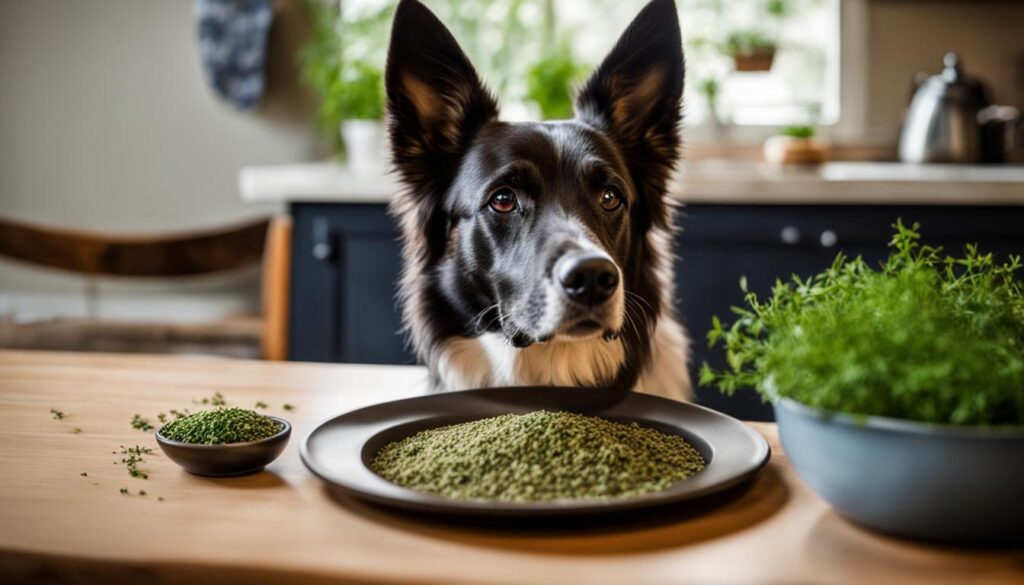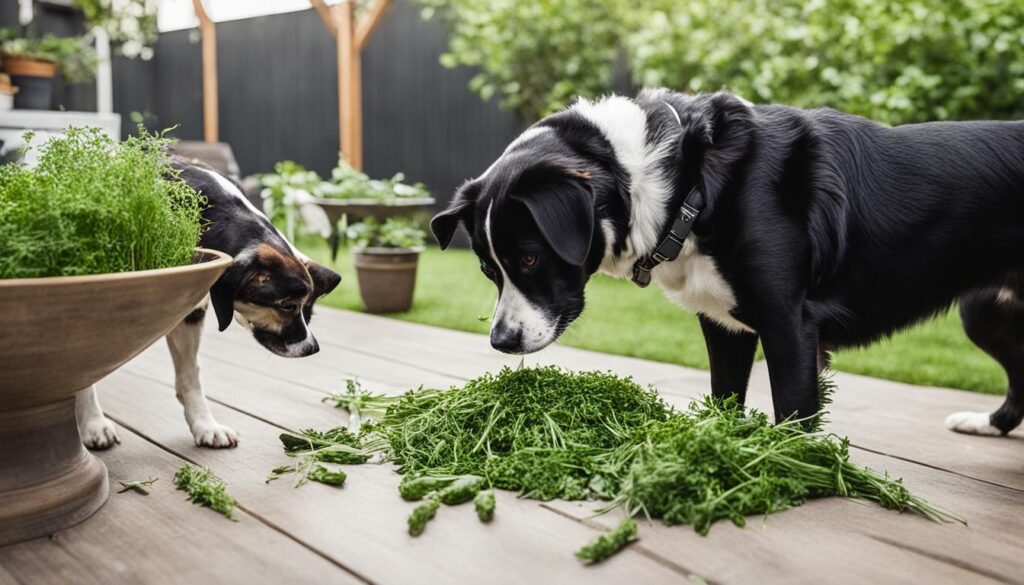As a responsible pet owner, it’s crucial to ensure that our furry friends are getting a balanced and healthy diet. We often wonder if we can share certain human foods with our dogs, including herbs like thyme. Thyme is a popular culinary herb known for its aromatic flavor and numerous health benefits.
So, can dogs eat thyme? The short answer is yes, but in moderation. Thyme is generally safe and can offer various health advantages for our canine companions. It contains essential vitamins, aids in digestion, acts as an antibacterial and antimicrobial treatment, removes parasites, and promotes respiratory health. However, it’s essential to exercise caution and consult with a veterinarian before introducing thyme or any other herbs into your dog’s diet.
Key Takeaways:
- Thyme is safe for dogs when given in moderation.
- It can provide several health benefits, such as aiding digestion and promoting respiratory health.
- Consult with a veterinarian before incorporating thyme into your dog’s diet.
- Monitor your dog for any potential allergies or adverse reactions to thyme.
- Precautions should be taken to ensure the thyme given to dogs is organic and free from pesticides.
What is Thyme and Its Health Benefits for Dogs

Thyme, known as Thymus vulgaris, is a widely used spice with medicinal, culinary, and decorative properties. It is safe to give to dogs and can provide a range of health benefits.
Thyme contains antispasmodic characteristics that aid in digestion and alleviate digestive health issues. It helps to relax the muscles in the digestive tract, reducing discomfort and promoting smoother digestion.
In addition to its digestive benefits, thyme is also high in essential vitamins such as vitamins A, C, and K. These vitamins contribute to overall health and can support a strong immune system, healthy skin, and proper blood clotting.
Furthermore, thyme exhibits powerful antibacterial and antimicrobial effects. It contains compounds that can help fight off harmful bacteria and pathogens, reducing the risk of infections and promoting oral health.
Thyme can also help remove parasites from a dog’s body. It has natural properties that can help eliminate intestinal parasites and keep the digestive system free from infestations.
Another health benefit of thyme for dogs is its positive impact on respiratory health. Thyme contains compounds that can help alleviate respiratory issues, such as coughing and congestion, and promote clear airways.
Overall, thyme is a valuable herb to incorporate into a dog’s diet. Whether it’s sprinkled on their food, used in homemade treats, or administered in other ways, thyme can provide numerous health benefits. However, it’s important to use thyme in moderation and consult with a veterinarian to ensure it suits your dog’s specific needs.
Incorporating Thyme in a Dog’s Diet

Thyme can be a wonderful addition to your dog’s diet, providing both flavor and health benefits. There are several ways to incorporate thyme into your furry friend’s meals and treats, ensuring they reap the rewards of this aromatic herb.
One simple way to introduce thyme is by sprinkling it as a topper on their regular food. Whether it’s dry or fresh thyme, a small amount can add a burst of flavor to their meal. Just remember to use thyme in moderation, as too much may overpower the dish.
If you enjoy cooking for your dog, homemade treats are a great opportunity to include thyme. You can find numerous dog-friendly recipes online that incorporate thyme into biscuits, muffins, or even frozen treats. These treats not only taste delicious but also provide the health benefits of thyme.
A lesser-known way to use thyme is in smoothies. Yes, dogs can enjoy smoothies too! Simply blend some dog-friendly fruits and vegetables, like bananas and carrots, with a sprinkle of thyme. The result is a nutritious and refreshing treat for your canine companion.
“Incorporating thyme into your dog’s diet can enhance their meals and provide additional health benefits.”
For dog owners who prioritize their pet’s oral hygiene, thyme can also be used for brushing their teeth. Mix a small amount of dried thyme with baking soda and gently brush their teeth to promote dental health. Thyme’s antibacterial properties can help freshen their breath and prevent oral issues.
Additionally, you can infuse thyme into your dog’s water to serve as a breath freshener and gum cleanser. Simply add a few sprigs of fresh thyme to their water bowl and let it steep for a while. Not only will it make their water more appealing, but it may also help improve their oral health.
Remember, while thyme can be beneficial for dogs, it’s important to consult with a veterinarian before making any significant changes to their diet. They can provide guidance on the appropriate amount of thyme to incorporate and ensure it aligns with your dog’s specific needs.
| Ways to Incorporate Thyme in a Dog’s Diet | Benefits |
|---|---|
| 1. Sprinkle as a food topper | – Adds flavor to meals – Provides essential vitamins |
| 2. Use in homemade treats | – Offers aromatic and tasty treats – Supports overall health |
| 3. Include in smoothies | – Nutritious and refreshing snack – Enhanced flavor |
| 4. Brush teeth with thyme | – Promotes dental health – Freshens breath |
| 5. Infuse thyme in water | – Acts as a breath freshener – Cleanses gums |
By incorporating thyme in various ways, you can enhance your dog’s meals, provide additional health benefits, and add some variety to their diet. Just make sure to use thyme in moderation and consult with a veterinarian for personalized advice.
Precautions When Giving Thyme to Dogs

While thyme is generally safe for dogs, it’s important to take certain precautions when incorporating it into their diet. Here are some key considerations:
Allergic Reactions
Dogs, just like humans, can have allergies. When introducing thyme to your dog’s diet, monitor their reaction closely. Signs of an allergic reaction may include itching, redness, swelling, or gastrointestinal issues. If you notice any adverse effects, discontinue thyme consumption and consult your veterinarian for guidance.
Organic Thyme
When sourcing thyme for your dog, opt for organic varieties to avoid potential exposure to pesticides and chemicals. By choosing organic thyme, you can provide your furry companion with a safer and more natural alternative.
Avoid Spanish Thyme
Spanish thyme, also known as Coleus spicatus, should not be given to dogs. It contains a toxic oil called diterpene, which can be harmful to their health. Always ensure that the thyme you give them is genuine thyme (Thymus vulgaris) and not Spanish thyme.
Proper Dosage
While thyme offers various health benefits, it’s essential to give it to your dog in appropriate amounts. Consult your veterinarian to determine the right dosage based on your dog’s size, weight, and overall health. Remember, moderation is key when incorporating any new ingredient into your dog’s diet.
| Precautions | Details |
|---|---|
| Allergic Reactions | Monitor your dog for signs of allergies: itching, redness, swelling, or gastrointestinal issues. Discontinue thyme consumption if any adverse effects occur. |
| Organic Thyme | Choose organic varieties to avoid pesticides and chemicals that can be harmful to your dog’s health. |
| Avoid Spanish Thyme | Spanish thyme (Coleus spicatus) contains a toxic oil called diterpene and should not be given to dogs. |
| Proper Dosage | Consult your veterinarian to determine the appropriate amount of thyme based on your dog’s size, weight, and overall health. |
Can Dogs Eat Thyme in Excess?

When it comes to feeding dogs thyme, moderation is key. While thyme can provide numerous health benefits for dogs, excessive intake can have negative consequences on their overall well-being, particularly on their digestive system. Giving too much thyme to dogs can lead to various symptoms, including diarrhea, vomiting, anorexia, difficulty breathing, and even behavioral changes like sadness or lethargy.
It is essential for pet owners to monitor the amount of thyme given to their dogs and avoid overfeeding. Like humans, dogs have different tolerance levels, so it’s crucial to observe their reactions and adjust the amount accordingly. If any adverse symptoms occur, it’s best to consult a veterinarian for guidance.
By maintaining a balanced and moderate approach to feeding thyme, pet owners can ensure a healthy and enjoyable experience for their furry friends.
| Signs of Thyme Toxicity in Dogs | Effects on Dogs’ Digestive System |
|---|---|
|
|
Is Spanish Thyme Safe for Dogs?

When it comes to thyme and dogs, it’s important to note that not all varieties are safe for our furry friends. Spanish thyme, in particular, poses a risk to dogs due to its toxicity. Unlike regular thyme, which is safe for consumption, Spanish thyme contains a toxic oil called diterpene.
This toxic oil found in Spanish thyme can have detrimental effects on dogs’ health, causing issues such as vomiting, respiratory problems, and other related complications. It’s crucial to understand the difference between Spanish thyme and regular thyme to ensure the safety of our canine companions.
The Dangers of Spanish Thyme
Spanish thyme, also known as Coleus aromaticus or Cuban oregano, can be easily mistaken for regular thyme due to its similar appearance. However, the toxic properties of Spanish thyme make it unsafe for dogs to consume. The toxic oil, diterpene, found in Spanish thyme can significantly impact the well-being of our canine companions.
When dogs ingest Spanish thyme, the toxic oil can lead to severe vomiting, which can further cause dehydration and potential electrolyte imbalances. Additionally, respiratory issues may arise, making it difficult for dogs to breathe properly. It’s important to avoid Spanish thyme in any dog’s diet to prevent these harmful effects.
Ensuring Your Dog’s Safety
To protect your dog from the dangers of Spanish thyme, always opt for genuine thyme and not its toxic counterpart. When introducing thyme into your dog’s diet, scrutinize the source and ensure it is free from Spanish thyme. By doing so, you can provide a safe and enjoyable culinary experience for your dog while avoiding any potential health risks.
Remember, as responsible pet owners, it’s essential to prioritize our dogs’ well-being by carefully selecting the herbs we incorporate into their diets. By staying informed and educated about the potential risks associated with herbs like Spanish thyme, we can ensure our canine companions stay healthy and happy.
| Thyme Varieties | Safety for Dogs |
|---|---|
| Regular Thyme | Safe for dogs |
| Spanish Thyme (Coleus aromaticus) | Unsafe for dogs |
Safe and Unsafe Herbs for Pets
When it comes to the safety of herbs for pets, it is important to have a clear understanding of which ones are safe and which ones should be avoided. While thyme is considered safe for dogs, there are other herbs that can also be incorporated into their diet without any harm. Some of the dog-safe herbs include:
- Basil
- Sage
- Parsley
- Rosemary
- Cilantro
- Lavender
These herbs can provide additional flavors and health benefits to your dog’s meals. However, it is important to use them in moderation and consult with a veterinarian to ensure they are suitable for your pet.
On the other hand, there are certain herbs that are considered unsafe for pets and should be avoided. These include:
- Allspice
- Bay leaf
- Cloves
- Curry
- Hops
- Marjoram
- Mustard seed
- Paprika
- Garlic
- Onions
- Scallions
- Chives
These herbs can be toxic to pets and may cause various health issues if ingested. It’s crucial to keep these herbs out of your pet’s reach and avoid using them in their meals or treats.
For a comprehensive list of safe and unsafe herbs for pets, it is always best to consult with a veterinarian. They can provide you with the necessary guidance and ensure the well-being of your furry friend.
Tips for Safely Feeding Herbs to Dogs

When it comes to feeding herbs to dogs, including thyme, it’s essential to prioritize their safety and well-being. By following these tips, you can ensure that your furry friend receives the benefits of herbs without any potential harm:
1. Choose Organic Herbs:
Opt for organic herbs to minimize the risk of pesticides and chemicals. Organic herbs are cultivated without the use of synthetic fertilizers or pesticides, making them a safer option for your dog’s consumption.
2. Thoroughly Wash Herbs:
Prior to feeding herbs to your dog, make sure to wash them thoroughly. This helps remove any dirt, insects, or debris that may be present on the surface. Clean herbs encourage a positive and hygienic feeding experience for your canine companion.
3. Keep Unsafe Herbs Out of Reach:
It’s important to be aware of herbs that are unsafe for dogs and keep them out of your pet’s reach. Certain herbs, such as allspice, bay leaf, and garlic, can be toxic to dogs and should be avoided altogether.
4. Consult with a Veterinarian:
Prior to introducing any herbs into your dog’s diet, consult with a veterinarian. They can provide guidance specific to your dog’s health needs and help you determine the appropriate herbs and dosage for your furry friend.
5. Proper Dosing:
Always give herbs to dogs in proper doses as recommended by a veterinarian. Some herbs may interact with medications or supplements that your dog is taking, so it’s crucial to adhere to the recommended dosage for their safety.
By following these tips, you can safely incorporate herbs, including thyme, into your dog’s diet. Prioritizing their health and consulting with a veterinarian will ensure a positive and beneficial herb-feeding experience for your beloved furry companion.
Serving Thyme to Dogs
Thyme can be served to dogs in various ways, providing them with both flavor and health benefits. Here are some tips for serving thyme to your furry friend:
- Add it as a topper: Sprinkle a small amount of thyme as a garnish on your dog’s regular food. This can enhance the taste and provide a nutritional boost.
- Create homemade treats: Incorporate thyme into homemade dog treats. You can find numerous recipes online that include thyme as an ingredient. Just remember to use it in moderation.
- Blend it in smoothies: If your dog enjoys smoothies, you can add a touch of thyme to their blend. However, make sure that the other ingredients are safe for dogs.
- Brush their teeth: Using a thyme-infused toothpaste or rubbing fresh thyme leaves on your dog’s teeth can help freshen their breath and promote dental hygiene.
- Add it to their water: Create a thyme-infused water by steeping fresh thyme leaves in water. This can serve as a breath freshener and promote oral health when your dog drinks it.
Remember:
When serving thyme to dogs, it is essential to use it in moderation and consult with a veterinarian. Every dog is different, and their dietary needs may vary.
By incorporating thyme into your dog’s diet, you can provide them with a tasty and beneficial herb that contributes to their overall well-being. However, always ensure that thyme is used safely and appropriately for your furry companion.
Wrapping Up
Thyme is a safe and beneficial herb that can be included in a dog’s diet. When given in moderation, thyme offers a range of health benefits for dogs. It aids digestion, provides essential vitamins, acts as an antibacterial and antimicrobial treatment, removes parasites, and promotes respiratory health.
While thyme is generally safe, precautions should be taken. Spanish thyme should be avoided as it contains a toxic oil called diterpene. It is important to use genuine thyme and not Spanish thyme when incorporating this herb into a dog’s diet. Additionally, monitoring for possible allergies or adverse reactions is vital.
Overall, thyme can be a valuable addition to a dog’s diet when used appropriately. It is important to consult with a veterinarian and follow their guidance regarding the appropriate amount of thyme to give to your dog. With proper care and moderation, thyme can contribute to your dog’s overall well-being.
FAQ
Can dogs eat thyme?
Yes, thyme is safe for dogs to eat. It can provide various health benefits when given in moderation.
What are the health benefits of thyme for dogs?
Thyme can aid in digestion, provide essential vitamins, act as an antibacterial and antimicrobial treatment, remove parasites, and promote respiratory health in dogs.
How can I incorporate thyme in my dog’s diet?
Thyme can be added as a topper on their food, used in homemade dog treats, added to smoothies, or used to brush their teeth. It can also be added to their water as a breath freshener.
Are there any precautions when giving thyme to dogs?
Yes, dogs can be allergic to thyme, so it is important to monitor their reaction when introducing it into their diet. Use organic thyme to avoid pesticides and chemicals. Always consult with a veterinarian before giving any herbs to dogs.
Can dogs eat thyme in excess?
No, it is important to give thyme to dogs in moderation. Excessive intake can lead to symptoms like diarrhea, vomiting, anorexia, difficulty breathing, and sadness.
Is Spanish thyme safe for dogs?
No, Spanish thyme contains a toxic oil called diterpene, which can cause vomiting, respiratory issues, and other problems in dogs.
What other herbs are safe or unsafe for pets?
Basil, sage, parsley, rosemary, cilantro, and lavender are generally safe for both dogs and cats. On the other hand, allspice, bay leaf, cloves, curry, hops, marjoram, mustard seed, paprika, garlic, onions, scallions, and chives are unsafe for pets.
What tips should I follow when feeding herbs to dogs?
Always opt for organic herbs, wash them thoroughly, keep unsafe herbs out of their reach, and consult with a veterinarian before giving any herbs to dogs.
How can I serve thyme to dogs?
Thyme can be served as a topper on their food, used in homemade dog treats, added to smoothies, used to brush their teeth, or added to their water as a breath freshener.
Can dogs eat thyme?
Yes, dogs can eat thyme. However, it should always be given in moderation and should not replace veterinary advice or treatment.






